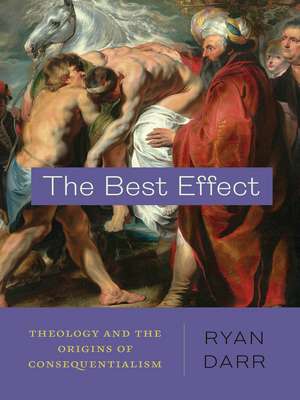The Best Effect: Theology and the Origins of Consequentialism
Autor Ryan Darren Limba Engleză Paperback – 6 dec 2023
Consequentialism—the notion that we can judge an action by its effects alone—has been among the most influential approaches to ethics and public policy in the Anglophone world for more than two centuries. In The Best Effect, Ryan Darr argues that consequentialist ethics is not as secular or as rational as it is often assumed to be. Instead, Darr describes the emergence of consequentialism in the seventeenth century as a theological and cosmological vision and traces its intellectual development and eventual secularization across several centuries. The Best Effect reveals how contemporary consequentialism continues to bear traces of its history and proposes in its place a more expansive vision for teleological ethics.
| Toate formatele și edițiile | Preț | Express |
|---|---|---|
| Paperback (1) | 215.81 lei 3-5 săpt. | +17.44 lei 4-10 zile |
| University of Chicago Press – 6 dec 2023 | 215.81 lei 3-5 săpt. | +17.44 lei 4-10 zile |
| Hardback (1) | 620.03 lei 6-8 săpt. | |
| University of Chicago Press – 6 dec 2023 | 620.03 lei 6-8 săpt. |
Preț: 215.81 lei
Nou
Puncte Express: 324
Preț estimativ în valută:
41.30€ • 42.87$ • 34.44£
41.30€ • 42.87$ • 34.44£
Carte disponibilă
Livrare economică 04-18 martie
Livrare express 15-21 februarie pentru 27.43 lei
Preluare comenzi: 021 569.72.76
Specificații
ISBN-13: 9780226829999
ISBN-10: 0226829995
Pagini: 320
Dimensiuni: 152 x 229 x 23 mm
Greutate: 0.45 kg
Ediția:First Edition
Editura: University of Chicago Press
Colecția University of Chicago Press
ISBN-10: 0226829995
Pagini: 320
Dimensiuni: 152 x 229 x 23 mm
Greutate: 0.45 kg
Ediția:First Edition
Editura: University of Chicago Press
Colecția University of Chicago Press
Notă biografică
Ryan Darr is a postdoctoral research associate in religion, ecology, and expressive culture at the Yale University Institute of Sacred Music and a lecturer in the Yale Divinity School.
Cuprins
Introduction
Part I: The Consequentialist Moral Cosmology
Chapter 1: God and Morality in the Seventeenth Century
Chapter 2: Virtue and the Divine Life: Henry More’s Moral Theology
Chapter 3: Teleology Transformed: Richard Cumberland’s Perfectionist Natural Law
Epilogue to Part I
Part II: Evil and the Divine Consequentialist
Chapter 4: Evil and the Consequentialist Moral Cosmology: Pierre Bayle and British Ethics
Chapter 5: The Ethics of Archbishop William King’s De origine mali
Chapter 6: Shaftesbury the Theologian: Virtue as Friendship with God
Chapter 7: Theodicy and the Moral Affections in Francis Hutcheson
Epilogue to Part II
Part III: The Anglican Utilitarian Synthesis
Chapter 8: John Gay’s “Preliminary Dissertation”
Chapter 9: Edmund Law and the Anglican Utilitarian Tradition
Epilogue to Part III
Conclusion
Acknowledgments
Notes
Index
Part I: The Consequentialist Moral Cosmology
Chapter 1: God and Morality in the Seventeenth Century
Chapter 2: Virtue and the Divine Life: Henry More’s Moral Theology
Chapter 3: Teleology Transformed: Richard Cumberland’s Perfectionist Natural Law
Epilogue to Part I
Part II: Evil and the Divine Consequentialist
Chapter 4: Evil and the Consequentialist Moral Cosmology: Pierre Bayle and British Ethics
Chapter 5: The Ethics of Archbishop William King’s De origine mali
Chapter 6: Shaftesbury the Theologian: Virtue as Friendship with God
Chapter 7: Theodicy and the Moral Affections in Francis Hutcheson
Epilogue to Part II
Part III: The Anglican Utilitarian Synthesis
Chapter 8: John Gay’s “Preliminary Dissertation”
Chapter 9: Edmund Law and the Anglican Utilitarian Tradition
Epilogue to Part III
Conclusion
Acknowledgments
Notes
Index
Recenzii
“In tracing the genealogy of consequentialist morals, Darr’s book offers a new critique of consequentialism. Consequentialist reasoning isn’t a natural, default way of doing ethics, a mode of moral reasoning in which we are free to engage as soon as we are liberated from the strictures of religion. Rather, it was invented, and invented for culturally contingent reasons. . . . Darr provides a detailed account of how consequentialist thinking evolved over the course of generations. These developments are fascinating, and I would recommend that anyone interested in them read the book.”
"A compelling genealogy of consequentialism that emphasizes not only its concern for acting well within a coherent moral cosmology, but also that throughout its early history, consequentialism was driven by explicitly theological concerns."
“Darr argues that contemporary secular consequentialism emerges out of the attempts of early modern moralists to make sense of God’s creative freedom, the existence of evil, and origins of human morality. This is a strikingly original thesis, defended by a close reading of the British moralists, informed by a keen sense of the philosophical and theological issues at stake. This book challenges our most fundamental assumptions about the history of moral thought and the reasonableness of the ‘greatest good’ as a moral standard.”
“Theologians and philosophers alike need more books like Darr’s rich account of the religious origins of consequentialist ideas. He brings to life texts most of us have forgotten but to which we owe more than we know. Darr argues that what we now consider a commonsense secular tradition had its origin in theological arguments about divine goodness. The clarity and originality of the story he tells offer a model of historical theology that I hope many will emulate."
“Consequentialism is a dominant ethical framework among contemporary ethicists, economists, legal theorists, and policy makers, particularly in secular circles. Darr’s careful and convincing study reveals that key components of the consequentialist framework arose from theological debates in the early modern period—debates about what an omnipotent and perfectly good being would or should do.”
